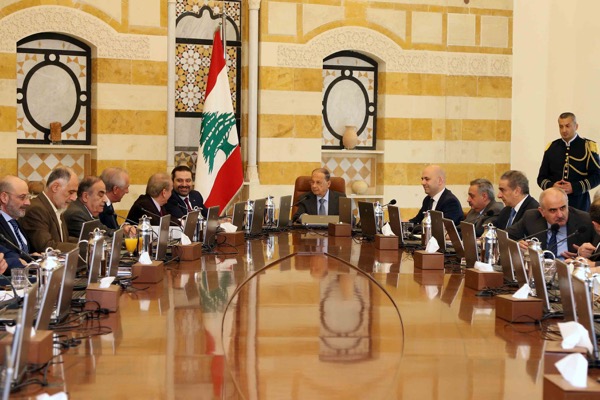
Three prominent Lebanese Christian political parties intend to boycott a scheduled parliamentary session later this week aimed at extending the parliament’s term for the third time since 2009 because of failure to reach consensus over a new electoral law.
The Free Patriotic Movement (FPM), the Lebanese Forces (LF) and the Phalange Party have voice repeated criticism of the 1960 electoral law, which still holds today, and have called for a new law
They say the law marginalises Christian voters, because, in the winner-take-all system Muslim voters in predominantly Christian districts decide who should win the elections
Extensive discussions on reforming the law in the past few months have been fruitless thus far.
But Lebanon’s Cabinet Monday formed a committee to “conduct research” on a new parliamentary electoral law.
Following a session at Baabda Palace chaired by President Michel Aoun, Information Minister Melhem Riachi told reporters that the committee will be headed by Prime Minister Saad Hariri and will convene at the Grand Serail “tomorrow [Tuesday] afternoon.”
When asked about the time it would take for them to complete their work, Riachi said that there is no set time limit, and that “anything is possible.”
The minister also said that the formation of a committee was done to “expedite the process” of agreeing on a new vote law.
President Aoun told ministers at the beginning of the session that the Cabinet’s meetings would be open-ended until a new electoral law agreement is reached.
“There will be no political vacuum in Parliament,” he said.
Aoun also met with Prime Minister Saad Hariri ahead of the session.
Hariri and the Future Movement have supported a hybrid law, although the prime minister has recently reiterated his interest in supporting any law as long as elections take place.
“We will head to the ballot boxes under whatever [electoral] law Parliament agrees on,” the prime minister said in a post on Twitter Monday.
Interior Minister Nouhad Machnouk has confirmed that there will be a “technical delay” in the parliamentary elections due to the requirements of the new electoral law.
Speaker Nabih Berri said that he does not expect the delay to last longer than six months once a new law is agreed upon.
The Information Minister told the press Monday that Cabinet did not discuss anything regarding a technical delay, and the committee will not be discussing it.
Prior to the session, Public Works and Transportation Minister Youssef Fenianos told local media, “We came here to put an end to the hybrid system and finalize the proportional vote law.”
“We oppose an extension, and we still support a hybrid electoral law,” Deputy Prime Minister and Health Minister said.
A high-ranking Hezbollah delegation met Sunday evening with Aoun at Baabda Palace and presented him with a proportional vote proposal aimed at narrowing the gap between rivals over a new electoral law to replace the disputed 1960 majoritarian system used in the last elections in 2009.
No details emerged of Hezbollah’s proposal, which has apparently failed to be adopted in today’s cabinet meeting
Hariri underlined in a speech in Parliament last Friday, the importance of consensus over a new electoral law.
The Iranian backed Hezbollah has repeatedly called for an electoral law fully based on proportional representation but other political parties, especially the Future Movement, have rejected the proposal and argued that the party’s controversial arsenal of arms would prevent serious competition in regions where the Iran-backed party has clout.In 2013 Lebanese Forces and The Future Movement backed by the PSP agreed on a hybrid electoral law which calls for 54% of the MPs to be elected under the majoritarian winner-takes-all system and 46 % under the proportional representation system. This draft law was rejected by the Hezbollah-led March 8 opposition.
Also in 2013 Future Movement leader PM Saad Hariri rejected the electoral law that is based on proportional representation because there will be competition in some regions, but there cannot be any competition in other regions, because of the presence of Hezbollah weapons in them.
Hariri was referring to the 2009 election in the areas dominated by Hezbollah. According to the reports that surfaced back then Hezbollah gunmen prevented their rivals from voting and the results of the election showed it. On the other hand in the March 14 dominated areas several Hezbollah backed candidates won the election that was based on winner takes all electoral law.
In a proportional representation system Hezbollah will be able to gain more seats in the March 14 dominated areas but will not lose any seats in its dominated areas as long as it is allowed to keep its arms and use them internally for political gain, according to political analysts
The country has not voted for a parliament since 2009, with the legislature instead twice extending its own mandate.
The 2009 polls were held under an amended version of the 1960 electoral law and the next elections are scheduled for May 2017.

Leave a Reply
You must be logged in to post a comment.